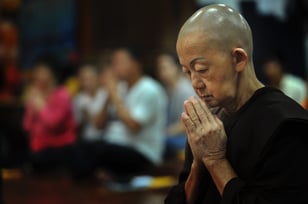Much has been said and written about addressing the medical needs of the elderly. But what about addressing their mental health needs? Or their spiritual needs?
One of the tenets of holistic senior care is that the spirit and mind should be cared for as much as the physical body. That’s not to suggest that anyone can pray away age-related illness. But most medical doctors will tell you that a happier patient is a patient whose body is more likely to respond positively to treatment.
And there’s plenty of evidence that satisfied, fulfilled seniors live longer.
The medical case for promoting happiness
A 2011 University of Illinois study review, published in the journal Applied Psychology: Health and Well-Being, found “clear and compelling evidence” that, “feeling positive about your life — not stressed out, not depressed — contributes to both longevity and better health among healthy populations. “
One of the studies the researchers reviewed had followed 5,000 university students for more than 40 years. It found that those students who had exhibited the most pessimism as undergraduates had tended to die earlier than their cohorts.
The belief that one’s spirit, consciousness or soul continues beyond this physical life into something else brings great comfort and a renewed sense of purpose to people in their golden years.
Another study reviewed in the University of Illinois paper had followed 180 Catholic nuns from young adulthood to advanced age. It concluded that individuals who had written positively about their lives while in their 20s were longer-lived than those who had been less optimistic in their younger years.
In short, happiness prolongs life. Laughter, it seems, may really be the best medicine.
How does spirituality play into geriatrics?
As Forbes contributor Robert Laura noted: “The idea of a spiritual retirement can carry with it a variety of connotations. It’s generally a taboo subject that few planners and clients ever address simply because there’s no guidebook or suggestions on how to best cover this topic.
 “Most traditional retirement plans address life up-to-death through life insurance and various estate planning techniques to create a financial legacy and ensure minimal taxation,” he wrote. “However, what I see missing is one of the most important retirement questions all of us face: Where and how do I plan to spend eternity?”
“Most traditional retirement plans address life up-to-death through life insurance and various estate planning techniques to create a financial legacy and ensure minimal taxation,” he wrote. “However, what I see missing is one of the most important retirement questions all of us face: Where and how do I plan to spend eternity?”
The belief that one’s spirit, consciousness or soul continues beyond this physical life into something else brings great comfort and a renewed sense of purpose to people in their golden years.
Indeed, this is recognized even from strictly secular viewpoints: It’s been hypothesized that religion evolved as a means of giving groups of humans a sense of purpose and, thus, cooperative social cohesion. Without reinforcing faith, the fundamental social contracts that define “right” and “wrong” were too easy to ignore in early tribal societies, and those societies that lacked them may have been the weaker for it.
Science aside, for many American seniors, faith is simply a source of happiness. So, doesn’t it follow that faith, or at least “spiritual wellness,” should be accounted for in our treatment of the elderly?
We believe so. When the spirit is hopeful, the mind is at peace. And when the mind is at peace, the limitations on the body aren’t so limiting on the spirit. There is balance. And balance promotes healing and fulfillment.
To that end, Episcopal Church Home takes an holistic view of retirement care — one which nurtures spiritual and mental wellness in seniors of all faiths, that encourages them in their beliefs, and addresses the physical needs of the body.
Learn more about Episcopal Church Home’s person-centered approach to senior care.
If your older loved one needs residential retirement care in Louisville, we’d love to show you the difference holistic care can make in seniors’ overall well-being.
Click here to learn more about our senior services — from assisted living to residential memory care — then come take a tour of our Kentucky retirement community.













